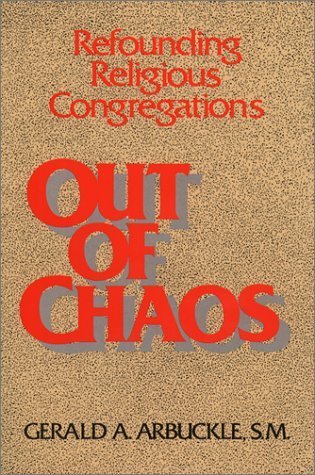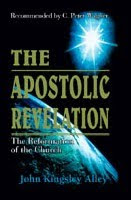The Marks of the Apostolic – A Mild Critique of Some Fivefold Thinking
 In recent years there has been a resurgence in thinking about the so-called “fivefold” “ascension gifts” shape to ministry. It has been furthered by the likes of Alan Hirsch and Mike Breen. It draws on Ephesians 4:11-12 in which Paul refers to five gifts from Christ, “the apostles, the prophets, the evangelists, the pastors and teachers, to equip his people for works of service…”
In recent years there has been a resurgence in thinking about the so-called “fivefold” “ascension gifts” shape to ministry. It has been furthered by the likes of Alan Hirsch and Mike Breen. It draws on Ephesians 4:11-12 in which Paul refers to five gifts from Christ, “the apostles, the prophets, the evangelists, the pastors and teachers, to equip his people for works of service…”
In general, despite a growing tendency to reduce it to some sort of personality inventory, fivefold thinking is helpful. I have, for instance, used it as a starting point to unpack what it means to be prophetic.
Here, however, I want to focus on the apostolic.
There’s a lot to commend in typical fivefold thinking about the apostolic. It will usually draw on the root word of “apostle” and the associated verb “apostello” which means simply “to send” with the nuance (in context) of being sent with purpose: i.e. appointed to go and do something. Hence the disciples who were the direct recipients of Jesus’ Great Commission are, rightly, “big-A” Apostles. And so is Paul, who received his appointment directly from the risen Christ later as one “untimely born” (1 Cor 15:8).
This can appropriately be applied to aspects of ministry today. There is something about the apostolic, for instance, that pertains to movement. The apostolic stimulates movement and seeks to lead a community into places where it needs to go but hasn’t. Just as the original Apostles took the gospel into Judea, Samaria, and to the ends of the earth, so the contemporary apostolic desires to extend the Kingdom of God in some way. In any new venture – church plant, missionary movement, activist community – you will likely find the apostolic at work, hearing the call of some “Macedonian Man” and heading out to answer (Acts 16:9-10).
The apostolic, therefore, is often associated with words like “entrepreneurial” or “visionary.” Mike Breen, answering a blog post question, says, for instance, “Apostles can’t help but start new things.” A site that expounds Breen’s lifeshapes, describes an apostle as a “Vision-keeper for the extension of the church’s mission, an entrepreneur/starter… bring strategic skills, risk taking, get things off the ground (church planting?).”
There is some truth to this. But it is also where I want to push back.
The apostolic is NOT primarily entrepreneurial. In my experience, it’s the evangelists who often have the crazy new ideas. Some of them even work!
The apostolic IS primarily parental. The original Apostles didn’t just break new ground, or go into new territory, they took the church with them, and birthed and grew whatever was begun. They bring the body of Christ on the journey, and they hold and cover whatever is formed.
Entrepreneurs can often be the worst at bringing people with them. To be sure, none of us are as friendly as the pastors, but belligerence is not the mark of the apostolic. Neither is a “vision and dump” mentality that says “well, I’ve started it, now you carry it.” I’ve even heard excuses made for toxic leadership, “It’s OK, some people have had trouble responding to the apostolic in him.” A corrective is needed.
Healthy apostles don’t behave like that. They don’t behave like bosses pursuing a vision despite the collateral damage. Yes, they are deliberate, determined even. And the movement is, often, outward, ground-breaking, map-making, and pioneering. But they take a “family” with them, and they form a household on the way, wherever they have gone. Because that is the point!
I thought it would be useful, therefore, to list some of the characteristics of the apostolic that I see in the pages of Scripture. It’s not an exhaustive list, and I’d love to receive other suggestions.
These are marks of the apostle that I see in Scripture:
The Apostolic Way is PARENTAL.
Paul writes the following to the Corinthians:
I am not writing this to shame you, but to warn you, as my dear children. Even though you have ten thousand guardians in Christ, you do not have many fathers, for in Christ Jesus I became your father through the gospel. Therefore I urge you to imitate me. For this reason I am sending to you Timothy, my son, whom I love, who is faithful in the Lord. He will remind you of my way of life in Christ Jesus, which agrees with what I teach everywhere in every church. 1 Corinthians 4:14-17
The language Paul uses of a father with his children or, (in the case of Timothy), his son, is obvious. His heart isn’t just to direct or dictate, but to impart, through relationship. The gospel is something to be modelled and embodied, and therefore imitated, not simply pursued as a function or task. This marks apostolic ministry.
Paul makes it even more explicit when he applies a maternal image to his ministry, as he writes to the Thessalonians:
As apostles of Christ we could have been a burden to you, but we were gentle among you, like a mother caring for her little children. We loved you so much that we were delighted to share with you not only the gospel of God but our lives as well, because you had become so dear to us. (1 Thessalonians 2:7-8)
This is why churches and church structures that revolve around programs and pragmatics have a sense of lifelessness to them – a stagnancy even in their busyness and sense of “success”; they have stepped away from the apostolic sharing of life to sterile functionalism.
The most apostolic people I know bring movement to the church, not just by leading the church, but by carrying it. They weep and laugh with it. They are broken by it, delighted by it. They hold it in some place primal, and there they carry it to the Lord and Father of us all. They imitate him, and are therefore worthy of imitation.
This does, however, lead to the second mark:
The Apostolic Way is PAINFUL.
The cost of parenthood is significant. There is great joy and fruitfulness in it, but also great pain. Any parent can tell you that. God, our Father, reveals the truest sense of this. The Apostle John alludes to this constantly:
“…to all who received him, to those who believed in his name, he gave the right to become children of God – children born not of natural descent, nor of human decision or a husband’s will, but born of God.” (John 1:12-13)
“…for God so loved the world that he gave his one and only Son, that whoever believes in him shall not perish but have eternal life.” (John 3:16)
And Paul, writing to the Romans, having spoken of the Holy Spirit as the Spirit of Adoption, by which we cry out “Abba, Father” then speaks of suffering as something of a family trait:
“Now if we are children, then we are heirs – heirs of God and co-heirs with Christ, if indeed we share in his sufferings in order that we may also share in his glory. I consider that our present sufferings are not worth comparing with the glory that will be revealed in us. The creation waits in eager expectation for the sons of God to be revealed.” (Romans 8:17-19)
The apostle’s “imitation” of the Father will lead the apostle, and any church that can rightly be called “apostolic,” on a path of suffering. This is not a defeatist trajectory, rather it is the “mind of Christ” – the kenotic (self-emptying) way that Paul speaks of in Philippians 2:1-11. No wonder, when Paul wants to speak of his apostolic power and authority, he sees the madness of leaning on his own strength and learning (2 Corinthians 11:21). Rather, “if I must boast, I will boast of the things that show my weakness” (11:30) so that “Christ’s power may rest on me.” (12:9).
Too often, we look up to a triumphalist form of church leadership. We look to persons who have been successful, who have achieved some empowerment of our organisation, and in them we place our trust. We are not far from accolading the so-called “super-apostles” that had bewitched the Corinthian church. In what I think is the defining description of apostleship, in 1 Corinthians 4, Paul pushes back at those who delight in being winners in the Christian world:
Already you have all you want! Already you have become rich! You have become kings – and that without us! How I wish that you really had become kings so that we might be kings with you! For it seems to me that God has put us apostles on display at the end of the procession, like men condemned to die in the arena. We have been made a spectacle to the whole universe, to angels as well as to men. We are fools for Christ, but you are so wise in Christ! We are weak, but you are strong! You are honoured, we are dishonoured! To this very hour we go hungry and thirsty, we are in rags, we are brutally treated, we are homeless. We work hard with our own hands. When we are cursed, we bless; when we are persecuted, we endure it; when we are slandered, we answer kindly. Up to this moment we have become the scum of the earth, the refuse of the world. (1 Corinthians 4:8-13)
I have learned to look for this “scum and refuse” moment in apostolic movements. If it is not there, I am wary. For instance, the apostolic qualification of a contemporary movement like Soul Survivor doesn’t lie in its many achievements (although I surely delight in them!), but in its foundation in the Wasteland.
The most apostolic people I know weep for, and because of, the church. In this sense they share in the sufferings of Christ, and lead the people on the same self-emptying path. Their tears take them to the heart of God. They cry themselves to sleep at night, and know the grace of God new in the morning. That is what makes a movement, and it can’t be generated by any entrepreneurial technique.
Which reveals a final mark of the apostolic:
The Apostolic Way is Compelled, not Controlled.
In some ways, this is just a natural consequence of the “sentness” of the apostolic. A pioneer cannot predict the path ahead. A pioneer cannot take a controlled path around obstacles and difficulties. By definition a pioneer is not following a map, they are making the map!
An apostle goes out with the family of God, not with a plan of control (“This is what we are going to do.”) but with a plan of purpose (“This is why we are going.”) And then they have to roll with whatever comes along. So often it is not what they planned; it is almost beyond them, in a direction where they must rely on the Holy Spirit. They are only strong because they are weak.
Paul’s plans for the evangelisation of all of the province of Asia were halted. Instead he and his companions are compelled by the Holy Spirit and find themselves bringing the gospel to Europe (Acts 16:6-10). And throughout Acts, we find a similar sense of Paul being out of control: he is imprisoned, driven by storms, compelled to escape violence. Even what seems like an attempt to free himself from prison by asserting his Roman citizenship only leads to further captivity… but still many opportunities for the gospel. So often, it seems, apostolic movement is more rightly characterised by “a wing and a prayer” than clever, entrepreneurial, goals.
The Apostle Peter, as he is (re)commissioned by Jesus at the end of John’s gospel, has a foreshadowing of the manner of his death. Jesus tells him “when you are old you will stretch out your hands, and someone else will dress you and lead you where you do not want to go” (John 21:18). John tells us that, most specifically, this statement indicates the kind of death that Peter would have. But it also colours the sense of Jesus’ very next words: “Follow me.”
So often, the apostle finds themselves “being led where you do not want to go.” Their plans go out the window, and they learn to return to the Father’s heart. There, in the midst of uncertainty, they follow the Spirit of Jesus, who only ever does what he sees the Father doing.
Paul, in his chains, brings the gospel even to members of Caesar’s household (Philippians 4:22). Peter, even in his death, glorifies God (John 21:19). It is not the path they may have chosen, but it is the path chosen for them. The apostle leads the apostolic church in embracing the weakness (and therefore the power) of this way.






